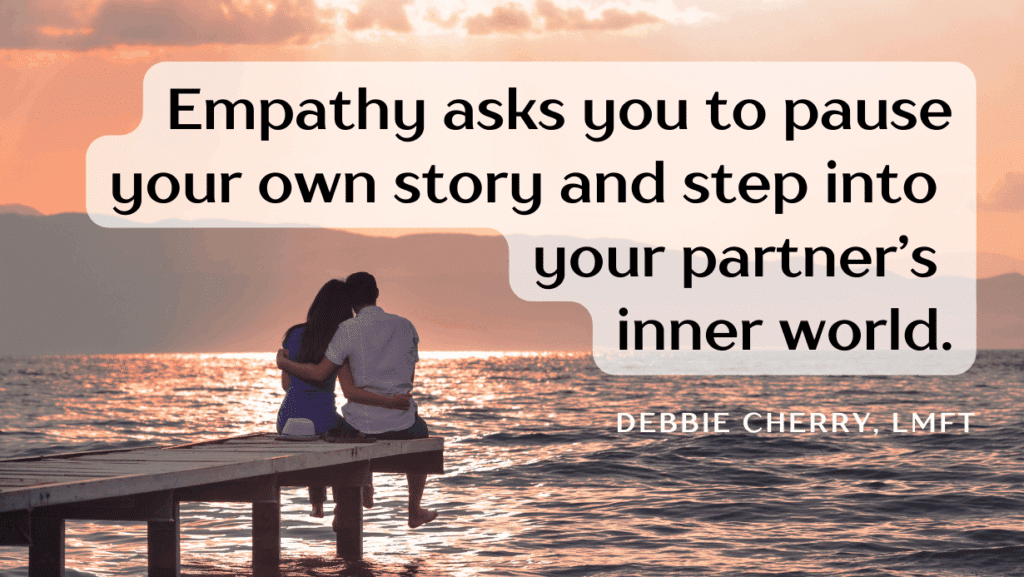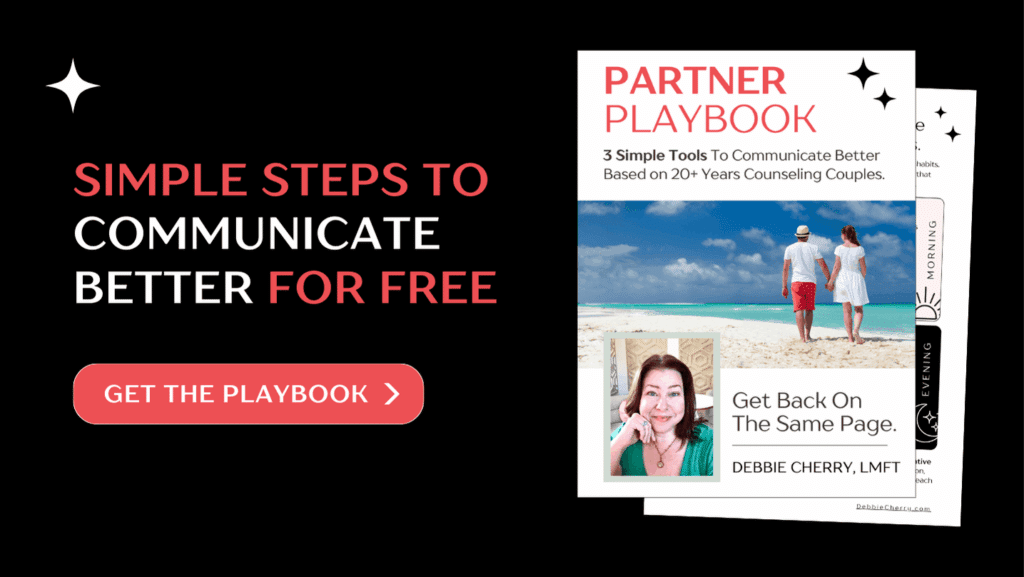FOCUS ON FEELINGS, RATHER THAN FACTS.
Ever feel like you and your partner are talking past each other?
You’re both trying to be heard, repeating the same points, but it’s like shouting into a void. Defenses flare before you even realize it, and suddenly you’re opponents, not teammates.
When we stop arguing about the facts or faults and focus on feelings, we create a bridge of connection. The true goal of communication is understanding, not winning.
Why Disagreements Spiral Without Empathy…
When you don’t feel heard, your instinct is to push harder. You correct the facts, defend your position, and brace for impact. Your nervous system perceives a threat, and fight-or-flight kicks in. Partners become enemies. Eye contact drops. You stop listening. You start preparing your defense before your partner even finishes their sentence.
Empathy Is the Antidote to Arguments.
Most conflicts aren’t about who’s right. They’re about needing to feel SEEN. Think of empathy like turning down the volume on your own story, so you can hear theirs.
Empathy stops the spiral by helping you pause your perspective and join theirs. When you attune to your partner’s feelings, you get back on the same page.
Conflicts often arise when each person is trying to convince the other to agree with their own thoughts and way of seeing things. Empathic listening breaks the negative cycle, and helps your partner feel seen. Defensiveness melts when you feel heard.

SAY WHAT YOU SEE, RATHER THAN WHAT YOU THINK.
❝Empathy starts when we respond with observations, not opinions.❞
Imagine you’re a narrator, not a judge or fixer… gently describing what you see happening in your partner’s emotional world.
Instead of reacting, try phrases like:
“I can see how that felt overwhelming.”
“I can see that this is so upsetting.”
You can disagree with someone’s logic and still care deeply about their pain. Focus on feelings, not who’s right, wrong, good or bad. Acknowledging the feelings builds a shared emotional reality… and that’s where true connection begins.
Validate Your Partner’s Feelings in 2 Easy Steps.
The next time your partner shares something, pause before responding. Don’t jump to a solution. Don’t offer a silver lining. Just try this:
1. Summarize what your partner said.
This is a quick reflection of their words. It helps them feel heard and slows you both down.
“I hear that you’re busy with work.”
“I hear you need more support.”
2. Empathize with what they’re feeling.
Say what you see. Use “I can see…” to reflect their emotional experience.
“I can see why that would feel frustrating.”
“I can see how hurtful that must’ve been.”
Instead of trying to prove your reality, use these two steps to first acknowledge theirs.
Become a Better Listener by Slowing Down.
Relationship research shows that simply slowing down to connect with your partner’s perspective cuts relationship problems by 50%.
Empathy requires space. Pause. Shift from “how do I fix this?” to “how are they feeling?” Instead of racing to correct the details, slow down and connect with the emotions. Even a 5-second breath before you speak is proven to significantly lower defensiveness.
Making space for conflicting viewpoints is essential for healthy relationships. Otherwise, communication will become about who can win.
✅ Download the free Empathy Reminders with tips & scripts (instant access, no email needed).
Feelings Are the Bridge Back to Connection.
Just last week, my husband was talking to me about his body falling apart. He was scared… his shoulders hurt, his leg kept going numb, eyes/ears/taste buds all going downhill… and the cancer cream he was using had revealed new patches.
I did what I teach couples every day… I listened with empathy. I said things like:
“I’m so sorry you’re going through this.”
“I can see how upsetting this is, especially with your family history.”
Then… I slipped. I got lost in my own discomfort and tried to shift the tone. I said, “Well, wouldn’t you want to make the best of it either way?” I was trying to be “helpful,” but made it about me.
He looked at me and said: “Debbie… isn’t this in all your worksheets?”
Oof. He was right.
That moment reminded me that empathy isn’t about agreeing. It’s about helping your partner feel SEEN by joining in their emotion – so they don’t feel so alone. So I paused. I took a breath. And I used my own playbook:
“I hear that you’re upset about aging. I can see why that’s so scary right now.”
I didn’t fix it. I just joined him in the feeling. We saw eye to eye by meeting in the emotion.
Empathy Is Attunement, Not Agreement.
You can totally disagree with what someone is saying and still connect with what they’re feeling.
❝You can’t logic your way back to closeness.❞
Empathy triggers the connection hormone, bringing calm and trust back into the relationship. Every time you pause to summarize and empathize, you create a micro-moment of repair.
Stop defending your reality long enough to make space for theirs.
That’s how couples grow closer.
Join, don’t judge.
Say what you see, not what you think.
Focus on feelings, not the facts.
Keep connecting,
Debbie Cherry, LMFT
Ready to stop the tug-of-war? 💝 Grab my free Partner Playbook to stop arguments and rebuild connection fast with fun couples exercises to practice. Or, book a free consultation to have a conversation about how couples therapy can help make these habits stick.
💬 FAQs About Validation and Empathy in Relationships
1. What is empathy in a relationship?
Empathy in a romantic relationship means tuning in to another person’s emotional world and responding with care. It involves understanding another person’s perspective, recognizing painful emotions, and offering compassion without judgment. Empathy includes both cognitive empathy (understanding someone’s thoughts) and affective empathy (feeling what they feel). These are key components that support healthy interpersonal relationships.
An empathetic person also practices emotional intelligence by staying aware of their own feelings while remaining open to their partner’s emotional needs. When couples prioritize emotional validation, they create a safe space where both people feel seen and understood. This leads to greater empathy, stronger social relationships, and improved emotional well-being. It also supports resilience through life’s challenges, even when individual differences in personality or communication style are present. You do not have to be happily married to benefit from empathy. It is a two-way street and a skill that anyone can build.
2. How do you show empathy to your partner?
You show empathy by practicing perspective-taking and imagining yourself in your partner’s shoes. This helps you connect more deeply, even when you do not agree. It begins with social cognition… tuning in to your partner’s emotional state — and continues with validating statements like “that makes sense” or “I can see why you’d feel hurt.” These words help your partner feel safe, heard, and emotionally supported.
An empathetic response often involves emotional empathy, which allows your partner to feel emotionally held, and cognitive empathy, which helps you respond thoughtfully. Over time, showing empathy becomes second nature. These skills build emotional intelligence and deepen your ability to connect with your loved ones, even during a hard time or when something difficult happens in life. Empathy helps remind you that feelings matter and lays the foundation for stronger relationships.
You show empathy by paying attention to your partner’s feelings, maintaining genuine interest, and offering emotionally validation. Even when only one partner focuses on building empathy, the entire dynamic can begin to shift. Showing empathy means tuning in to other people’s emotions, offering self compassion when you feel overwhelmed, and seeing things from your partner’s shoes. Over time, these tools become second nature and create space for better understanding and more empathy.
3. Why do I struggle to validate my partner’s feelings?
Many people were never taught how to validate emotions, so it can feel unfamiliar or uncomfortable. You might have learned to avoid painful emotion, minimize conflict, or “fix” things quickly. But validation means slowing down and focusing on your partner’s emotional experience instead of the facts.
Sometimes, your partner’s emotions might trigger your own feelings or remind you of bad things you have been through. This can block your ability to empathize. If your partner communicates differently due to personality, past trauma, or individual differences, you might feel unsure how to respond. You may unintentionally offer sympathy or unsolicited advice when your partner is really looking for emotional empathy.
The good news is that validation is a skill you can develop. By practicing empathy and pausing your automatic responses, you create a safer space for connection and support. These efforts help you become a more emotionally attuned partner or spouse and a more empathetic person overall.
4. How do I validate someone’s feelings without agreeing?
You can validate someone’s feelings even if you see the situation differently. Validation is about honoring their emotional reality, not agreeing with every detail. You might say, “I can understand why that would be upsetting,” or “That makes sense given what you were feeling.” These responses reflect both cognitive and affective empathy and help the other person feel understood.
This approach builds trust and makes your relationship safer for vulnerability. It also shows that you care about their emotional well-being and understand the importance of social relationships. Over time, practicing this kind of empathy will help increase empathy across the relationship and lead to better understanding, even during moments of tension or disagreement.
5. How do I deal with a partner who doesn’t validate my feelings?
It can be difficult when your partner doesn’t seem to understand or acknowledge your emotions. Not everyone was raised in an emotionally aware environment, and many people haven’t learned the communication skills needed to empathize. They may struggle with social cognition or simply feel overwhelmed by their own feelings.
You can start by clearly expressing your needs. Try saying, “I don’t need you to fix it. I just want to feel understood.” Modeling emotional empathy in your own responses can gently encourage your partner to develop empathy. Even if they are not an empathetic person yet, consistent modeling can help create a shift.
If this challenge continues, couples therapy can help both partners increase empathy and build stronger communication skills. It can also support emotional well-being during life’s harder seasons and strengthen your bond with your loved ones.
6. What are some communication skills that build emotional empathy?
Empathy is built through small, consistent communication habits. Start with active listening. Reflect back what your partner says instead of responding right away. Use emotionally validating statements like “that makes sense” or “I hear how upset you are.” These signals let your partner know their feelings matter.
Avoid giving unsolicited advice or trying to solve the problem too soon. Focus on understanding how your partner feels. Imagine yourself in your partner’s shoes and respond with care. Paying attention to tone of voice, body language, and facial expressions will also help you better understand their emotional experience.
These practices use both cognitive empathy and emotional empathy and help create greater empathy overall. They are especially helpful in building deeper emotional intelligence and improving social relationships… not only in romantic partnerships, but also with friends, family, and loved ones.
📚 Evidence-Based Resources on Empathy in Relationships
- The Science of Effective Communication and Empathy for Couples
A comprehensive guide on empathy skills, emotional attunement, and compassionate listening in partnerships.
Read it on PubMed Central - Journal of Social and Personal Relationships — Couple Similarity in Empathic Accuracy
A scholarly study showing how partners’ empathic accuracy alignment impacts relationship well-being.
Explore the findings on ResearchGate / SAGE preview - Five-Second Breaks Can Help Couples Defuse Conflict
Reporting on a study in Communications Psychology showing that even a 5-second pause during arguments significantly lowers aggression.
Read The Guardian article summarizing the study - Motivation and Empathic Accuracy in Couples Under Conflict
Research exploring how relationship-serving versus partner-serving motivation influences empathy during conflict.
Read the full study on PMC - “5-Second Rule” Helps Diffuse Arguments Between Couples
Business Insider summary of the same University of St Andrews study highlighting the real-world impact of brief conflict de-escalation.
Check the coverage on Business Insider



